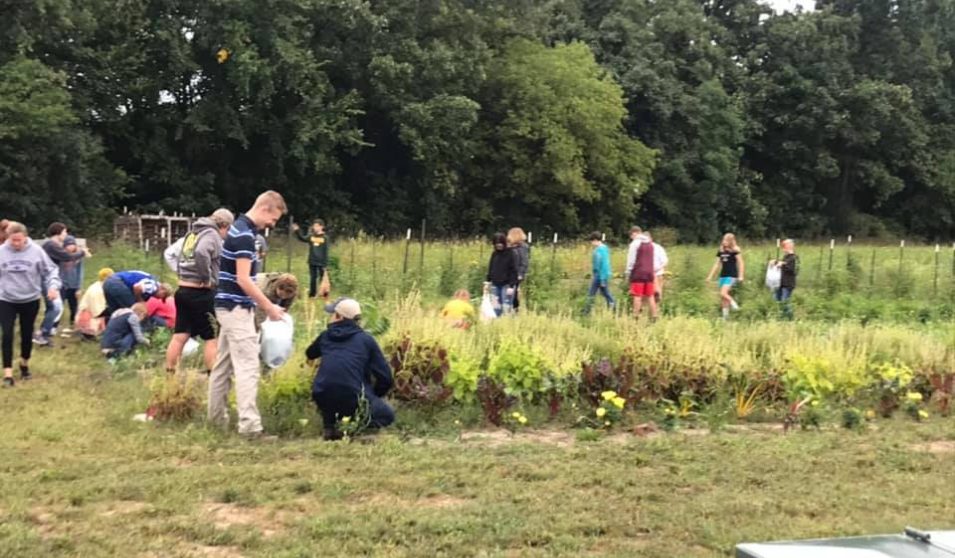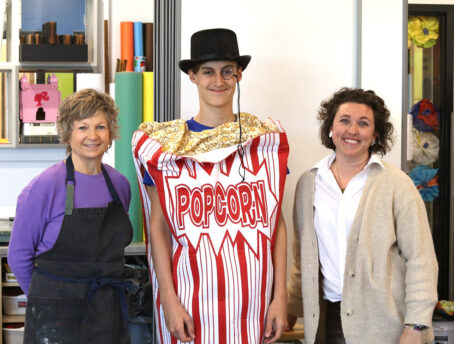For this month’s Cultivating Community feature, Laura Emrick, founding teacher for the Koshkonong Trails School (KT) in Cambridge, Wisconsin, shares this brief glimpse of how policy change and community action has impacted students at this project-based and place-based school:
“There was a parent that said this school was life-changing for their child. I was like, ‘wow, it changed their life?’ Then the very next parent said that this school was life-saving for their child.”
In telling about their school, Emrick and her colleague Adam Gould, director of the Severson Learning Center which hosts KT, talk through not just how the Cambridge community came together to support students, but why they chose to undertake such a venture.
Policy change is no easy feat, even at the local level, and maintaining a diverse group of interests long enough to bring a program to fruition requires a good deal of effort. Misunderstandings, limited resources, and the loss of energy to continue are among the many barriers that cut grassroots action short before it has the chance to grow and flourish.
Despite these challenges, a shared vision for what could be and an earnest desire to do right by each and every student in a community has proven decisive for policy change in local school districts. A commitment to the common good is what united an effort in Cambridge to establish this new public charter school for middle and high school students seeking a different path.
Emrick notes that while the label as a “public charter” frequently conjures up negative connotations, the true driving force behind the creation of KT is more akin to achieving a democracy of education, where all students have equal access to a form of schooling that best serves their individual needs.
Growing an Idea
Housed on an 80-acre farm donated by Oscar Severson as a site for environmental and experiential learning, KT grew from the ideas of district administrator Bernie Nikolay’s desire to more fully utilize the property, and former director for the Severson Learning Center Jen Scianna’s first-hand experience seeing students respond positively to hands-on, project-based education.
Emrick tells how Scianna “started traveling, looking, and learning from other charter schools like Wildlands in Eau Claire [Wisconsin],” and later joined the Teton Science Schools’ Place Network to enter into an innovative place-based learning community of schools across the country. Through exploration and collaboration, a governing board was set up and KT was created in the belief that a fully project-based school would be an opportunity for the community to offer all students an equal chance at receiving an engaging and inspiring education.
“A scientist turned science teacher,” Emrick was hired on at KT from the start and admits that “it was my first experience in implementing restorative practices, rather than having students who are getting infractions, and watching our students grow together and make better choices. Really, some of them turned their lives around because they felt they were a part of something, and they felt it was fresh start for them.”
Relearning how to Learn
“It’s been a bumpy road, there’s so much work in founding a new school,” Emrick says, “but what is consistent through all of that is the learning. The way you learn is up to you and they’re starting to become true, lifelong learners.”
That transition, Emrick and Gould both affirm, is what KT has been about from the beginning. Emrick goes on to say that “everyone has a different learning style and what works for one doesn’t work for all, and the school district is trying to provide something for everyone.” KT offers students a second path different from what they would receive in a traditional setting. “You can’t ‘sit-and-get’ here; the students have to seek and achieve learning targets…I really had to teach students how to unlearn their way of learning.”
Emrick confides that the process “is a lot of work getting them comfortable, rolling up the sleeves and getting back in there and trying again,” but the result of this determination is transformational for students. “You start to see the students have success and you start to see it working…students start feeling brave, confident, and happy to be intellectual.”
Gould recalls how he once “had a shy student who took some time to open up. This student originally took on a project to build a replacement door for a shed and now [after going through the program at KT] he is graduating early. I can’t imagine that he would have done that at the public high school because he wouldn’t have had the support and the confidence to realize his own potential.”
“You watch what they’re naturally inclined to do, and you let them follow that path for a while. If it’s really sticking and if it’s something they feel strongly about, then we try to get them job shadows and get them in some work studies to see if they could learn from professionals in the community,” Emrick adds.
From working with scientists to analyze invasive species and conservation officers to understand wildlife protection, to meeting with professionals around Cambridge to learn about small engines, construction, and the region’s trademark pottery, Emrick says “we’re giving them an opportunity to learn about everything they need to learn about different career paths. We work with pre-apprenticeships and give them options to take local tech college courses to get started early. That’s what our students would really say they love the most.”
Gould continues that “sometimes experts are other kids in the school who I can rely on to help me with another grade level that’s coming in [to visit the SLC], or they help each other.”
Classroom as Community/Community as Classroom
Most importantly, Gould and Emrick assert, KT gives students a sense of belonging:
“I’m not doing anything different than other teachers are—other teachers are trying to connect with their students—but it is that family, they feel a part of something [here]. Nobody here is left out; nobody here is eating alone. That is the true definition of community: caring for one another. Caretaking takes place here, even with middle school and high school students when it can be a really challenging time to navigate at other schools,” Emrick says.
After seeing how rapidly their students have grown through the program, Emrick and Gould reveal that more and more community members and parents have pitched in to help out at the school, making KT a truly community-based institution.
Gould explains that “I have a list of experts who I can call in, and many of those names are parents of kids who go to school here. There’s just so many connections that are interwoven with each other that really help make it go.”
Emrick agrees, adding that “there are members of our local community who no longer see our school as something their student is doing, but something that they too play a role in. Students feel different when they’re learning from somebody who doesn’t spend their day teaching students.”
Sharing the Good
When asked about some of the most memorable projects KT students have done, Gould remarked that “just the ability to have a field day—that’s one of the advantages of this school. We have these two school vans and we’re going to check out the recycling plant, or we’re going to collect seeds, or we’re going to go do something in the community. You can’t just do that in a public school for a number of reasons.”
Emrick is reminded of how students at KT are encouraged to “show acts of kindness to the community. One time, students went to local senior centers to play games, bake, and listen to and record [seniors’] stories. Many of these seniors don’t have family nearby and don’t have frequent visitors. I thought this was really brightening the day of these individuals, but at the same time our students were learning these really unique things about the histories of these individuals. This triggered one student to interview four seniors who lived to be 100 years old about what their lives were like and then made comparisons to teenagers today.”
In just three years since the school was chartered, KT has grown to include Raquel Parish, Emrick’s fellow teacher, and around thirty students from eight different school districts. Through the shared vision and determination of Parish, Emrick, Gould, and their school and community partners, the staff at KT are excited for the future of the program, the students they can empower, and the community bonds they can all build together.
Reflecting on it all, Emrick comments that “there’s a great connection taking place here, and the role our students play in that is huge. You can’t really go out ahead and tell people how great this thing is; you just have to let the stories be told by the students themselves, and the actions the school is taking, and the results that are produced.”
Cultivating Community is a project of the I Am a Rural Teacher national advocacy campaign, funded by The Bill & Melinda Gates Foundation. School communities are recognized on a monthly basis for policy decisions that have strengthened the bonds between schools and communities.
Cultivating Community nominations must come from classroom teachers. If their nomination is selected, they will receive a $250 classroom grant!
Written by John Glasgow.




